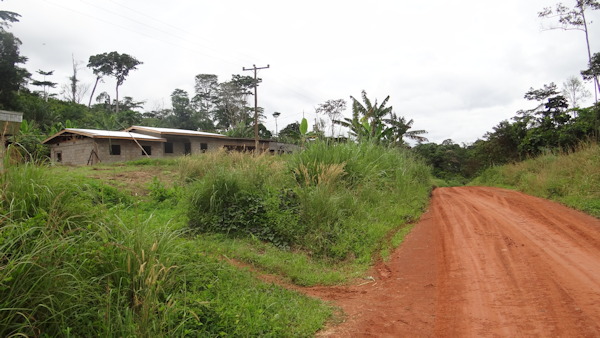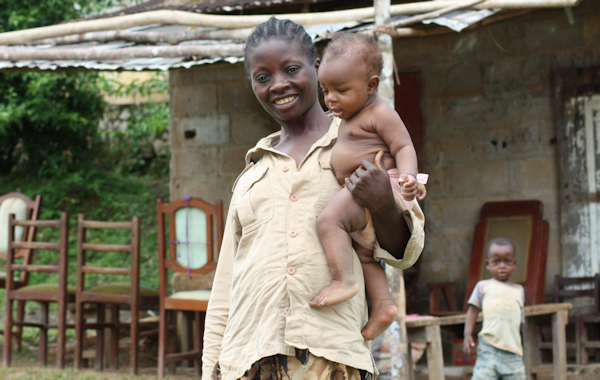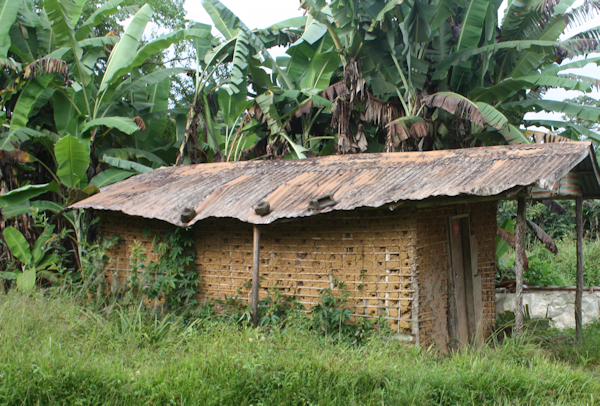Biyõlé yà Ndáa Bõt
Ñkóbõ Búlu ô bilí bifíá b'iziñ bí á lítí avál avé mõt a tií aa nlam éziñ. Bifíá b'iziñ bifê bí á lítí avál avé mõt a vúmán, ñgê náa a n'abíálé, aa mõt mfê.
Ma: Ê Mõt a a Kóbõ
tatê: my father/mon père
nanê: my mother/ma mère
náa: my grand-mother/ma grand-mère
titá: my grand-father/mon grand-père
jàl: my village/mon village
moójàñ: my sibling of the same gender as me/mon frère (si je suis un homme), ma sœur (si je suis une femme)
jaájàñ: my mother's village/le village de ma mère
mìntyì: my father-in-law or my mother-in-law/mon beau-père ou ma belle-mère
mìntyì ê miñgá: my mother-in-law/ma belle-mère
mìntyì ê fám: my father-in-law/mon beau-père
ndômejàñ: my mother's brother/le frère de ma mère
ñmiale: my brother-in-law, my syster-in-law/mon beau-frère, ma belle-sœur
kál ê jam: my sister (I am a man)/my soeur (je suis un homme)
ndôm jam: my brother (I am a woman)/mon frère (je suis une femme)
Wo: Ê Mõt M'A Kóbõõ Nyê
ésoó: your father/ton père
nyuá: your mother/ta mère
moónyòñ: your brother (if you are a man), your sister (if you are a woman)/ton frère (si tu es un homme), ta sœur (si tu es une femme)
jaányòñ: your mother's village/le village de ta mère
ésoñgó: your paternal aunt ( your father's sister)/ta tante paternelle (une sœur de ton père)
ndômenyoñ: your mother's brother/le frère de ta mère
nyo kál: your sister (you are a man)/ta soeur (tu es un homme)
nyo ndôm: your brother (you are a woman)/ton frère (tu es une femme)
jàl dôé: your village/ton village
Nyê: Ê Mõt M'a (Bí á) Jôõ Nyê
ésaá: his or her father/son père
nyiá (benyiá): his or her mother(s)/sa mère (ses mères)
moónyàñ (bobênyàñ): his brother(s) (if it is a man), her sister(s) (if it is a woman)/son frère (pour un homme) (ses frères), sa sœur (pour une femme) (ses sœurs)
kál: his sister/sa sœur (de l'homme)
èmvám: his or her grandparent (either gender)/son grand-parent (homme ou femme)
ndômenyañ: his or her mother's brother/le frère de sa mère
ésañgá: his or her paternal aunt (his or her father's sister)/sa tante paternelle (la sœur de son père)
jaányàñ: his or her mother's village/le village de sa mère
ñgál (beyál): his wife (his wives)/sa femme (ses femmes)
ñnôm (beyôm): her husband(s)/le mari de la femme dont on parle (ses maris)
ntyi (betyi): his or her parent-in-law (father or mother)/son beau-père ou sa belle-mère (ses beaux-parents)
ntyi ê miñgá: his or her mother-in-law/sa belle-mère
ntyi ê fám: his or her father-in-law/son beau-père
kál jé: his sister (he is a man)/sa soeur (il est un homme)
ndôm jé: her brother (she is a woman)/son frère (elle est une femme)
jàl dé: his village/son village (il est une femme)
jañ dé: her village/le village d'une femme
Bifíá Yà Éyoñ Èse
Mfá'á wu, wo yiane kô'ôlane éfíá yà liti avál avé mõt aa nlam bê, ñge ke avál avé mõt a, n'ábíálé aa nyí mbók. Õ ne bo ê de avále dá ya mevále melál.
Wo yiane tátè yem ê bifíá b'iziñ bí ne:
monêñgon: son of his or her mother's (whole) village/fils du village de sa mère (pour tout le village de sa mère)
ñnômeñgon (beyôm-beñgon): son-in-law, daughter's husband (refers to his wife's whole village)/beau-fils, le mari d'une fille de la famille ou du village (ce nom concerne tout le village)/
nyui = monenyui (bobenyui): orphan(s)/orphelin(e)(s)
ñnêñ (beyêñ): visitor, guest/visiteur(s) (étranger, étrangers)(généralement bienvenu, invité ou pas)
Ma: Ê Mõt a a Kóbõ
(Biyõlè bí ne ávále di (ma tili biyôlé b'iziñ aa !! Nalé a a tinane náa wo yiane sa'ale éyôlè éte amú ê valè mê vé ya éyõlè j'á yiane.)
ésaá wom (= tatê): my father/mon père
ésaá woñgán (= tatê): our father/notre père
nyiá wom (= nanê): my mother/ma mère
moónyàñ tatê = moónyàñ ésaá wom: my paternal uncle (my father's brother)/mon oncle paternel (le frère de mon père)
kále tatê = kál'ésaá wom: my paternal aunt/ma tante paternelle (la sœur de mon père)
ndômenyañ ê jam (= ndômejàñ) (!!): mon maternal uncle, my mother's brother/mon oncle maternel, le frère de ma mère
ndôme nanê = ndôme nyiá wom (= ndômejàñ): mon oncle matermel (le frère de ma mère)/my paternal uncle (my mother's brother)
moónyàñe nanê = monyañe nyiá wom: ma tante maternelle (la sœur de ma mère)/my maternal aunt (my mother's sister)
moónyàñe wom (!!) (= moójàñ): mon frère (si je suis un homme), ma sœur (si je suis une femme)/my sibling of the same gender as me
èmvám jam: mon grand-parent (homme ou femme)/my grandparent (either gender)
jàl ê dam = jàdáam: mon village/my village
jàl ê nyiá wom (!!) = jàle nyiá wom (!!) (jaàjàñ): le village de ma mère/my mother's village
ndôme nanê (!!) = ndôme nyiá wom (ndômejàñ): mon oncle maternel (le frère de ma mère)/my mother's brother
moónyañe nanê = moónyañe nyiá wom: ma tante maternelle (la sœur de ma mère)/my mother's sister
ntyi ê wom (!!) (= mintyi): mon beau-père ou ma belle-mère/my father-in-law or my mother-in-law
miñgã wom: ma femme (si je suis un homme)/my wife (if I am a man)
ñnôme wom: mon mari (si je suis une femme)/my husband (if I am a woman)
nyiá miñgá wom = mintyi ê miñgá: ma belle-mère (la mère de ma femme)/my mother-in-law (my wife's mother)
ésaá miñgá wom = mintyi ê fám: mon beau-père (le père de ma femme)/my father-in-law (my wife's father)
ñmialé wom (!!) (= ñmialé): mon beau-frère, ma belle-sœur/my brother-in-law, my sister-in-law
E Mõt Mía Nyê Mí á kóbõ
ésaá wôé (!!) (= ésoó): ton père/your father
ésaá wonán (= ésoó): votre père/your collective father
nyiá wôé (!!) (= nyuá): ta mère/your mother
moónyàñ wôé (!!) (moónyòñ): ton frère (s'il s'agit d'un homme), ta sœur (s'il s'agit d'une femme)/your brother (for a man), your sister (for a woman)
jaányàñ dôé (!!) = jalê nyuá (= jaányòñ): le village de ta mère/your mother's village
moònyàñe nyuá: ta tante maternelle (la sœur de ta mère)/your maternal aunt (your mother's sister)
ndôme nyuá (!!) (= ndômenyòñ): le frère de ta mère/your mother's brother
miñgã wôé (!!) (= nyo ñgál): ta femme (si tu es un homme)/your wife (if you are a man)
ñnôme wôé (!!) (= nyo ñnôm): ton mari (si tu es une femme)/your husband (if you are a woman)
nyo... Ô ne belan éfiá "nyo" náa ô líti náa e mõt wo jôo nye a tií a e mõt mía nye míá kóbõ
Bifíá bí ne:
nyo món: ton enfant/your child
kál ê jôé = nyo kál: your sister (you must be a man)/ta sœur (tu dois être un homme)
ndôme jôé = nyo ndôm: ton frère (pour une femme)/your brother (you must be a female)
émvám jôé (= nyomvám ?): ton grand-parent (homme ou femme)/your grandparent (either gender)
nyo ñgál: ta femme (si tu es un homme)/your wife (if you are a man)
nyo ñnôm: ton mari (si tu es une femme)/your husband (if you are a woman)
nyoó ntyi: ton beau-parent (homme ou femme)/your parent-in-law (either gender)
nyo mvôé = nyomvôé: ton ami(e)/your friend (either gender)
Ê Mõt Mí á Jôõ Nyê
émvám jé (!!): son grand-parent (homme ou femme) (souviens-toi que le pronom "jé" n'est pas nécessaire)/his or her grandparent (either gender)
ésaá ñgál: le père de sa femme/his wife's father
moónyàñe ésaá ñgál: son bel-oncle maternel (le frère du père de sa femme)/his maternal uncle-in-law (the brother of his wife's father)
nyiá ñgál: la mère de sa femme/his wife's mother
ndôme jèé (!!) (= ndôm): son frère (pour la femme)(retiens que le pronom "jé" est non nécessaire)/his brother (for a woman)
ésaá ñgál: le père de sa femme/his wife's father
kál ésaá: la sœur de son père/his or her father's sister
nyiá wèé (!!) (benyiá bé): sa mère (ses mè res) (le pronom "wèé" n'est pas nécessaire)/his or her mother (the pronoun "wèé" is useless)
jaányàñ dé (!!) (= jaányàñ): le village de sa mère (retiens que le pronom "dé" n'est pas nécessaire)/his or her mother's village (remember that the "dé" pronoun is not necessary)
ntyi ê wèé (!!) (= ntyi): son beau-père ou sa belle-mère (le pronom "wèé" n'est pas nécessaire)/his or her parent-in-law (father or mother)(the pronoun "wèé" is not needed)
miñgá wèé = ñgál (!!) (beyál bé = beyál): his wife (wives)/sa femme (ses femmes)
ñnôm wèé (!!) = ñnôm (beyôm bé = beyôm): son mari (ses maris) (le pronom "wèé" n'est pas nécessaire)/her husband(s)
ndômenyañ jé (!!) = ndômenyiá wèé (!!) = ndômenyañ: le frère de sa mère (les pronoms "jé" et "wèé" ne sont pas nécessaires)/his or her mother's brother (remember, the pronouns "jé" and "wèé" are not necessary)
B'a dañe belan, ñge ke náa é mbe tum náa bífíá bí tií aa "ntyi" ("ntyi", "mintyi", "nyontyi", akeeke), bí mbe bí tií a e ndôman é ñgá lúk. Miñgá aa belan éfiá "mbebáé". Nal'a ne náa bebíáé be mon'a fám be ne mimbebáé asú mon'a Miñgá


